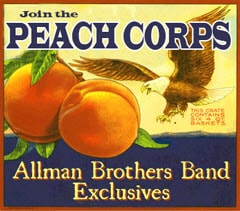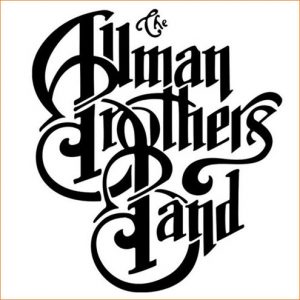By: G. Brown
For The Denver Post
9/15/2003
Few groups evoke as many gasps of “Are they still around?” as the Allman Brothers Band.
During the late ’60s and early ’70s, the band conjured a mix of virtually every American musical form – blues, country, R&B, jazz and rock – bound by an ethos of soaring concert improvisation.
The Allmans’ benchmark early albums remain noted for the graceful interplay between Duane Allman and Dickey Betts, one of rock’s most gifted guitar duos.
The band has survived tragedy, including the deaths of Duane Allman and original bassist Berry Oakley, plus the vagaries of substance abuse, legal wrangling and intraband discontent.
Just three years ago, Betts was forced out of the band on the eve of its summer tour. The Allmans played to half-filled houses; for many devotees, paying to see the Southern rock stalwarts without Betts was akin to seeing the Rolling Stones minus Keith Richards.
But the Allmans have found stability. Old fans might find the notion sacrilege, but the 2003 edition of the jam-band progenitors – they perform Friday at Red Rocks Amphitheatre – is as strong as in its 1969-1972 heyday.
A bold claim, but one bolstered by three facts: Warren Haynes and Derek Trucks are terrific guitarists who, while steeped in the band’s repertoire, bring their own creative fire into play. Leader Gregg Allman’s world-weary singing has never been better. And a new album called “Hittin’ the Note,” the band’s first release since Betts’ firing, is vintage ABB.
“We try hard,” Allman said recently. “It’s weird how things happen and turn around. We landed on our feet.”
Haynes, the Gov’t Mule frontman who has played off and on with the Allmans since 1989, says the band stills aims for improvisational greatness.
“We’re all our own worst critics,” Haynes said. “But I’ve been really impressed with how consistent this band is on a nightly basis and how fearless it is as a unit – they’ll go anywhere, anytime and not be concerned about how they might or might not get back.”
“They’re a legendary band clearly back at the peak of their powers,” said Mike Drumm, president of Denver-based Music Link Productions and producer/director of “Live at the Beacon Theatre.”
The two-DVD “Beacon” project captures this year’s run of shows at the New York venue. Set for release on Sept. 23, it features more than three hours of live footage culled from two performances, plus interviews and photos.
Drumm said the band’s latest incarnation is taking the original template and “executing it on an awe-inspiring plane, honoring the past and having the ability to interject their own personality within that structure.”
Since its 1969 inception, the Allman Brothers Band has endured as one of rock’s premier live acts, with a series of musicians tearing through jazzy interludes and long blues-rock jams. They disbanded, regrouped, splintered into various offshoots and disbanded again before coming together in 1989 and returning to nearly peak form. The 1995 Rock and Roll Hall of Fame inductees’ concerts – polyrhythmic explorations that never devolve into sonic noodling – garnered a new generation of fans.
Haynes and Trucks have come into their own. In Rolling Stone magazine’s recent issue on the 100 greatest guitarists, they landed at No. 23 and No. 81, respectively. (Duane Allman came in at No. 2 behind Jimi Hendrix.)
Haynes, one of the finest slide guitarists anywhere, has a rival for the title in his own band. Trucks, the wunderkind nephew of ABB drummer Butch Trucks and husband of blueswoman Susan Tedeschi, has released acclaimed albums of his own.
“The original model with Duane and Dickey was so powerful that we all had to learn and study that stuff,” Haynes said.
Haynes and Trucks, who had often jammed before becoming the Allmans guitar tandem, wound up reworking their roles within the band.
“So song by song, we had to delegate who was going to take what role,” Haynes said. “There are certain slide guitar-oriented songs that we change on a nightly basis. That helps keep us fresh.”
A jazz parallel
Great musicians don’t guarantee great chemistry, but Haynes sees a kinship between the Allmans and some of the great jazz ensembles.
“The aspect we have where someone will play in the hole that someone else left reminds me of the Miles Davis Quintet with Tony Williams, Ron Carter, Wayne Shorter and Herbie Hancock, the way that the music constantly sounded like a conversation,” he said. “That’s not something you can plan or force or rehearse. Either the people can do it or they can’t.”
Recovering from Betts’ ouster, Haynes and Gregg Allman have geared up their writing. Betts sang and penned many of the band’s trademark songs: “Blue Sky,” “In Memory of Elizabeth Reed” and “Ramblin’ Man” among them.
But Allman claimed that Betts’ drinking and drug use interfered with the band’s performance.
Cynics have asked if Allman is pot or kettle. He fought an alcohol problem for years and endured a much-publicized drug trial in the 1970s. But at 54, he seems to have turned a corner.
“Butch and I were leaving (the band) – I had my letter already written out,” Allman said. “Somehow our wives got to talking. I didn’t know he was also leaving. So we got together and he asked me, ‘Are you through with it? Have you done everything you feel like you need to do in this band?’ I said, ‘Not really.”‘
Allman and Trucks decided to confront Betts about his behavior. They sent a letter asking him to seek treatment. “He didn’t go in by a certain date, so that was it,” Allman said.
Despite the turmoil, the band sounds in full stride. To be sure, “Hittin’ the Note” has some of the hottest guitar solos heard this year – or in 1969, for that matter.
The meandering “Desdemona” is a she-done-me-wrong slow blues (“I make my living/Pouring out my pain”) that turns into an inspired boogie jam. Another highlight is “High Cost of Low Living,” a wonderful vehicle for Trucks” otherworldly slide playing – it’s a cautionary tale of hard living, and Allman still sounds like the best white blues belter around.
“It sure sounds autobiographical,” Allman said. “If the shoe fits . . . it probably fits a lot of people.
“Blues is usually about a good man feeling bad about a good woman,” he said. “Or not having any money, or a broken-down car. But the real art of blues is, you’ve got a story about a man that’s hurting, but somehow you inject some humor in it. Muddy Waters was the king of this, if you ask me.”
The Allmans rock harder than a band with four AARP-eligible members is expected to. Laurels, they believe, aren’t for resting on.
“All of the newer members in the band are there for the most part because they respect the original model so much and learned so much from it,” Haynes said. “But we all have other influences that are way across the boards, so we can tap into those as well and keep focused on what directions the Allman Brothers should have gone or could have gone.”
“It feels refreshing,” Allman added. “In the end, you get the same result, but more refined. I think it has to do with maturing. You’re putting a glaze on your art form.”
——————————————————————————–
Solid survivor
Who: The Allman Brothers Band with Karl Denson’s Tiny Universe
Where: Red Rocks Amphitheatre
When: 6 p.m. Friday
Tickets: $37.50-$42.50 at all Ticketmaster outlets. 303-830-TIXS



